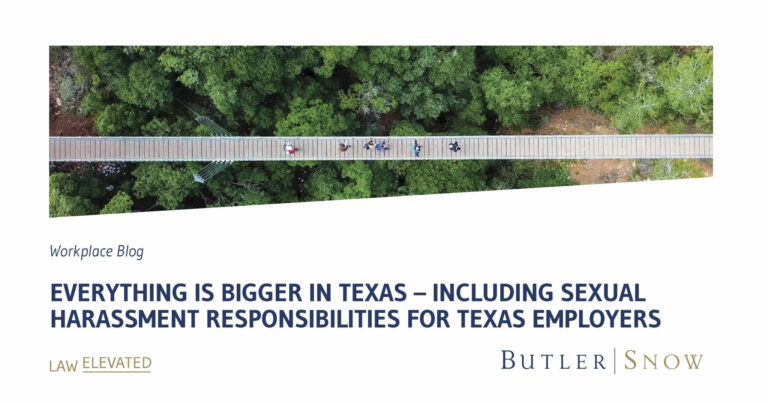While September 1, 2021 marked the day that hundreds of new Texas laws went into effect, two of them should be carefully considered by all Texas employers: House Bill 21 and Senate Bill 45. Both laws enlarge sexual harassment protection for employees and place new compliance obligations on Texas businesses, large and small. Texas employers should be aware of three critical changes to the law.
Texas employers with one or more employees can now be liable for workplace sexual harassment.
Chapter 21 of the Texas Labor Code governs employment discrimination. Under the general definitions in section 21.002, the statute has previously applied only to a private employer “who is engaged in an industry affecting commerce and who has 15 or more employees for each working day in each of 20 or more calendar weeks in the current or preceding calendar years,” and an agent of the employer. Effective September 1, 2021, S.B. 45 (as enacted in Texas Labor Code section 21.141) more broadly defines “employer” for purposes of a sexual harassment claim as: “a person who: (A) employs one or more employees; or (B) acts directly in the interests of an employer in relation to an employee.” (emphasis added).
This new definition eliminates the 15-employee minimum for sexual harassment claims and applies to employers in all industries. As a result of these changes, it is now advisable for all Texas employers, regardless of workforce size, to have appropriate sexual harassment policies in place and to be prepared for legal compliance under the amended statute.
Employers now must take “immediate and appropriate corrective action” upon actual or constructive knowledge of sexual harassment occurring.
S.B. 45 (as enacted in Texas Labor Code section 21.142) creates potential liability for employers who fail to respond appropriately when the employer has actual or constructive knowledge that sexual harassment has occurred. It reads:
“An employer commits an unlawful employment practice if sexual harassment of an employee occurs and the employer or the employer’s agents or supervisors: (1) know or should have known that the conduct constituting sexual harassment was occurring; and (2) fail to take immediate and appropriate corrective action.” (emphasis added).
Application of this provision will be extremely fact specific in every case, and questions of both fact and law will surround whether sexual harassment has “occurred” in a particular situation and whether the responsive action was sufficiently prompt and corrective to satisfy the statute. Regardless, to put themselves in the best position to defend claims, employers should develop a consistent and well-documented plan to follow should it receive a complaint or become aware of a situation involving potential harassment.
Employees now have a longer time to file workplace sexual harassment complaints against their employers.
A third important change to Texas sexual harassment law extends the time that an employee can file a complaint against his or her employer with the Texas Workforce Commission. Previously, under section 21.202 of the Texas Labor Code, an employee had 180 days to submit a complaint about any type of unlawful employment practice protected by the statute. The statutory amendment passed by H.B. 21 extends the filing deadline for sexual harassment complaints to 300 days from the date of the alleged sexual harassment. All other types of workplace complaints still must be filed within 180 days.
Notably, the longer deadline for sexual harassment complaints only applies to alleged sexual harassment that occurred on or after September 1, 2021. For any sexual harassment that allegedly occurred before September 1, 2021, the employee still has only 180 days to file his or her complaint.
Conclusion
Practically speaking, these 2021 amendments to Texas employment law mean that all companies, regardless of size or industry, need to diligently implement or potentially revise their sexual harassment policies and procedures. This includes providing training to employees on how to report complaints, developing compliant written policies, setting up reporting and investigation protocols, and making sure supervisory personnel understand how to respond (and how not respond) to complaints. Employers with questions about their obligations under the new law should contact an experienced employment law attorney for further consultation.
